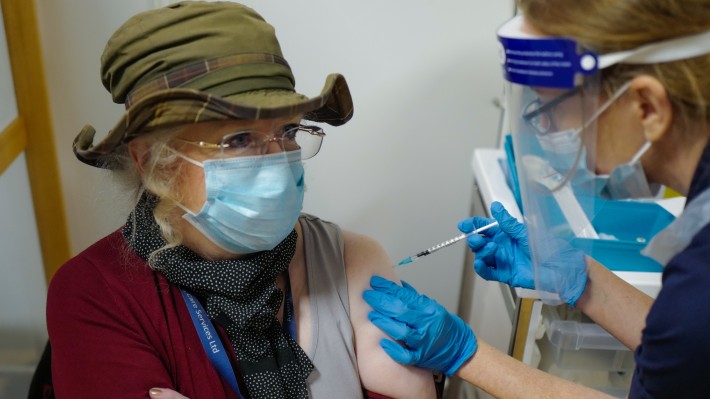Coronavirus: scientists call for campaign to warn of post-vaccination Covid risk
Experts fear that members of public will become lax about safety measures after getting long-awaited jabs

A free daily email with the biggest news stories of the day – and the best features from TheWeek.com
You are now subscribed
Your newsletter sign-up was successful
The UK’s Covid-19 vaccination campaign may fail to stop the spread unless the government launches an information campaign to combat complacency among people who have had the jab, scientists are warning.
New research outlined in a report “due to be published in the coming days” by the Sage advisory group suggests that members of the public may “let down their guard” after being inoculated - with potentially disastrous results, the i news reports.
As report author Professor Susan Michie warns, “no vaccine is 100% effective”. The Pfizer/BioNtech vaccine, which started being rolled out in the UK last month, offers up to 95% protection against Covid-19.
The Week
Escape your echo chamber. Get the facts behind the news, plus analysis from multiple perspectives.

Sign up for The Week's Free Newsletters
From our morning news briefing to a weekly Good News Newsletter, get the best of The Week delivered directly to your inbox.
From our morning news briefing to a weekly Good News Newsletter, get the best of The Week delivered directly to your inbox.
Michie, director of the centre for behaviour change at University College London, told the news site that “there is polling evidence of people potentially changing their behaviour after they have been vaccinated, in terms of reducing protective behaviours and thinking that restrictions are no longer so important”.
Warning that the benefits of the Covid jabs could be “undermined” as a result, she called on the government to launch “a major public education campaign about the importance of keeping up all the protective behaviours after you have been vaccinated”.
The plea comes after an NHS nurse told the BBC that she was “angry and heartbroken” to have tested positive for the virus three weeks after receiving her first vaccination jab.
The unnamed nurse, who works for the Hywel Dda University Health Board area in west Wales, said she was told the vaccine would begin to offer some protection after ten days. But three weeks later, she began to feel unwell and had a test that confirmed she was infected.
A free daily email with the biggest news stories of the day – and the best features from TheWeek.com
The health board’s deputy CEO Dr Philip Kloer has pointed out that while the vaccine “reduces your chance” of infection, “there is particular risk that you may have contracted Covid-19 immediately prior to having the vaccine without knowing it, or that you may contract it in the week or two following vaccination as your body builds up protection”.
Health experts fear that these provisos are going largely unheard, however.
According to the i news site, “scientists are growing increasing concerned that ministers have placed too much emphasis on the vaccine providing the country with a route out of the pandemic”. Boris Johnson has repeatedly referred to the jab as a means to “defeat the virus”.
Calling for caution, England’s deputy chief medical officer ,Professor Jonathan Van Tam, told a Downing Street press briefing last week that the public needed to be “patient” and resist the urge to act with “wild abandon” after being inoculated.
Chas Newkey-Burden has been part of The Week Digital team for more than a decade and a journalist for 25 years, starting out on the irreverent football weekly 90 Minutes, before moving to lifestyle magazines Loaded and Attitude. He was a columnist for The Big Issue and landed a world exclusive with David Beckham that became the weekly magazine’s bestselling issue. He now writes regularly for The Guardian, The Telegraph, The Independent, Metro, FourFourTwo and the i new site. He is also the author of a number of non-fiction books.
-
 The ‘ravenous’ demand for Cornish minerals
The ‘ravenous’ demand for Cornish mineralsUnder the Radar Growing need for critical minerals to power tech has intensified ‘appetite’ for lithium, which could be a ‘huge boon’ for local economy
-
 Why are election experts taking Trump’s midterm threats seriously?
Why are election experts taking Trump’s midterm threats seriously?IN THE SPOTLIGHT As the president muses about polling place deployments and a centralized electoral system aimed at one-party control, lawmakers are taking this administration at its word
-
 ‘Restaurateurs have become millionaires’
‘Restaurateurs have become millionaires’Instant Opinion Opinion, comment and editorials of the day
-
 A Nipah virus outbreak in India has brought back Covid-era surveillance
A Nipah virus outbreak in India has brought back Covid-era surveillanceUnder the radar The disease can spread through animals and humans
-
 Trump HHS slashes advised child vaccinations
Trump HHS slashes advised child vaccinationsSpeed Read In a widely condemned move, the CDC will now recommend that children get vaccinated against 11 communicable diseases, not 17
-
 A fentanyl vaccine may be on the horizon
A fentanyl vaccine may be on the horizonUnder the radar Taking a serious jab at the opioid epidemic
-
 Health: Will Kennedy dismantle U.S. immunization policy?
Health: Will Kennedy dismantle U.S. immunization policy?Feature ‘America’s vaccine playbook is being rewritten by people who don’t believe in them’
-
 How dangerous is the ‘K’ strain super-flu?
How dangerous is the ‘K’ strain super-flu?The Explainer Surge in cases of new variant H3N2 flu in UK and around the world
-
 Vaccine critic quietly named CDC’s No. 2 official
Vaccine critic quietly named CDC’s No. 2 officialSpeed Read Dr. Ralph Abraham joins another prominent vaccine critic, HHS Secretary Robert F. Kennedy Jr.
-
 This flu season could be worse than usual
This flu season could be worse than usualIn the spotlight A new subvariant is infecting several countries
-
 Covid-19 mRNA vaccines could help fight cancer
Covid-19 mRNA vaccines could help fight cancerUnder the radar They boost the immune system